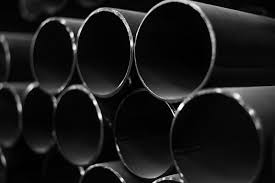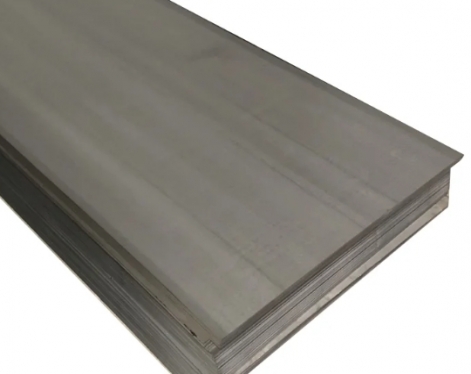What is mild steel?
Mild steel is steel made from a combination of iron and carbon. It has good magnetic properties due to the presence of iron. Mild steel is not alloy steel. Because there's more carbon, its chemical composition is very different from other elements or other steels, and because mild steel has good surface quality, you can increase its surface hardness in different ways. Mild steel is a type of steel containing 0.05%-0.25% carbon. Due to its plasticity and ductility, the material is easy to shape and process. Mild steel parts are generally very suitable for stamping and forging. Mild steel is widely used in tools, automotive body parts, construction and infrastructure.
What is black mild steel pipe(MS pipe)?
Black mild steel pipe is made of mild steel and treated with black paint or enamel protective coating.

Application of black mild steel pipe
1. Oil pipeline
Mild steel pipes have relatively low carbon content, so they have poor hardness but good elasticity. They are generally used in oil pipelines.
2. Boiler tubes
First, mild steel pipes are made of mild steel and have good plasticity and toughness. They can continuously deform under high temperatures and pressures, are not prone to cracking and deformation during boiler operation, and can resist fatigue damage from cyclic stress, ensuring the safe operation of the boiler. Secondly, mild steel pipes have a small thermal expansion coefficient and can expand and contract slowly when the temperature changes, avoiding stress concentration and deformation caused by thermal expansion and contraction, thereby extending the service life of the boiler. Finally, mild steel pipes have high strength and can withstand large tensile and compressive forces under high temperatures and pressures, ensuring the strength and stability of the boiler.
3. Exhaust pipe
It can also be used in automotive exhaust or air conditioning systems on some cars and trucks.
4. Fuel pipeline
It can also be used for structural support in construction projects or as fuel lines for gas appliances such as furnaces and stoves.
Mechanical indicators of black mild steel pipe
1. Yield strength: the yield strength of mild steel pipe is usually below 200MPa, which means that after being subjected to a certain tensile stress, the material begins to plastically deform and no longer returns to its original shape.
2. Tensile strength: the tensile strength of mild steel pipe is usually between 400-500MPa, which indicates the maximum force that the material can withstand when subjected to tensile stress.
3. Elongation: the elongation of mild steel pipe is usually between 20-30%, which indicates the maximum deformation the material can withstand when it reaches tensile stress.
4. Fracture toughness: the fracture toughness of mild steel pipe is usually between 50-100J/m2, which indicates the energy absorption and load-bearing capacity of the material when subjected to impact loads.
These mechanical indicators are of great significance to the performance, application and processing of mild steel pipes and can be used in material selection, design and uation.
Mild steel is steel made from a combination of iron and carbon. It has good magnetic properties due to the presence of iron. Mild steel is not alloy steel. Because there's more carbon, its chemical composition is very different from other elements or other steels, and because mild steel has good surface quality, you can increase its surface hardness in different ways. Mild steel is a type of steel containing 0.05%-0.25% carbon. Due to its plasticity and ductility, the material is easy to shape and process. Mild steel parts are generally very suitable for stamping and forging. Mild steel is widely used in tools, automotive body parts, construction and infrastructure.
What is black mild steel pipe(MS pipe)?
Black mild steel pipe is made of mild steel and treated with black paint or enamel protective coating.

Application of black mild steel pipe
1. Oil pipeline
Mild steel pipes have relatively low carbon content, so they have poor hardness but good elasticity. They are generally used in oil pipelines.
2. Boiler tubes
First, mild steel pipes are made of mild steel and have good plasticity and toughness. They can continuously deform under high temperatures and pressures, are not prone to cracking and deformation during boiler operation, and can resist fatigue damage from cyclic stress, ensuring the safe operation of the boiler. Secondly, mild steel pipes have a small thermal expansion coefficient and can expand and contract slowly when the temperature changes, avoiding stress concentration and deformation caused by thermal expansion and contraction, thereby extending the service life of the boiler. Finally, mild steel pipes have high strength and can withstand large tensile and compressive forces under high temperatures and pressures, ensuring the strength and stability of the boiler.
3. Exhaust pipe
It can also be used in automotive exhaust or air conditioning systems on some cars and trucks.
4. Fuel pipeline
It can also be used for structural support in construction projects or as fuel lines for gas appliances such as furnaces and stoves.
Mechanical indicators of black mild steel pipe
1. Yield strength: the yield strength of mild steel pipe is usually below 200MPa, which means that after being subjected to a certain tensile stress, the material begins to plastically deform and no longer returns to its original shape.
2. Tensile strength: the tensile strength of mild steel pipe is usually between 400-500MPa, which indicates the maximum force that the material can withstand when subjected to tensile stress.
3. Elongation: the elongation of mild steel pipe is usually between 20-30%, which indicates the maximum deformation the material can withstand when it reaches tensile stress.
4. Fracture toughness: the fracture toughness of mild steel pipe is usually between 50-100J/m2, which indicates the energy absorption and load-bearing capacity of the material when subjected to impact loads.
These mechanical indicators are of great significance to the performance, application and processing of mild steel pipes and can be used in material selection, design and uation.









